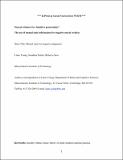Neural evidence for "intuitive prosecution": The use of mental state information for negative moral verdicts
Author(s)
Saxe, Rebecca R.; Scholz, Jonathan; Young, Liane
DownloadSAxe-2011-IntuitiveProsecution.pdf (573.8Kb)
OPEN_ACCESS_POLICY
Open Access Policy
Creative Commons Attribution-Noncommercial-Share Alike
Terms of use
Metadata
Show full item recordAbstract
Moral judgment depends critically on theory of mind (ToM), reasoning about mental states such as beliefs and intentions. People assign blame for failed attempts to harm and offer forgiveness in the case of accidents. Here we use fMRI to investigate the role of ToM in moral judgment of harmful vs. helpful actions. Is ToM deployed differently for judgments of blame vs. praise? Participants evaluated agents who produced a harmful, helpful, or neutral outcome, based on a harmful, helpful, or neutral intention; participants made blame and praise judgments. In the right temporo-parietal junction (right TPJ), and, to a lesser extent, the left TPJ and medial prefrontal cortex, the neural response reflected an interaction between belief and outcome factors, for both blame and praise judgments: The response in these regions was highest when participants delivered a negative moral judgment, i.e., assigned blame or withheld praise, based solely on the agent's intent (attempted harm, accidental help). These results show enhanced attention to mental states for negative moral verdicts based exclusively on mental state information.
Date issued
2011-01Department
Massachusetts Institute of Technology. Department of Brain and Cognitive SciencesJournal
Social Neuroscience
Publisher
Informa UK (Taylor & Francis)
Citation
Young, Liane, Jonathan Scholz, and Rebecca Saxe. “Neural Evidence for ‘intuitive Prosecution’: The Use of Mental State Information for Negative Moral Verdicts.” Social Neuroscience 6.3 (2011): 302–315. Web. 13 Apr. 2012.
Version: Author's final manuscript
ISSN
1747-0919
1747-0927